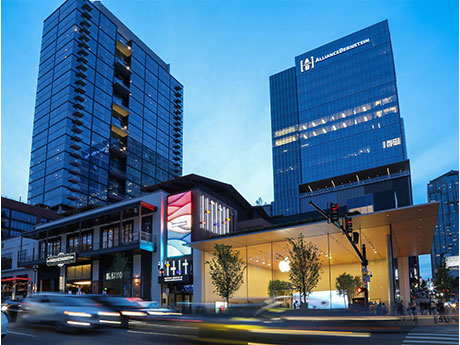Nashville’s economy experienced some of the healthiest growth in the nation in 2022, with an annual job growth rate of 5.8 percent, exceeding the U.S. growth rate of 4.1 percent, based on data from Oxford Economics.
Nashville also received high marks from the Urban Land Institute and PricewaterhouseCoopers, ranking as the No. 1 Market to Watch in their 2023 Emerging Trends in Real Estate report. The report credited Nashville’s tremendous and sustained population growth, and its economic diversity. Referred to as a “Supernova,” Nashville grew by an average of 5 percent since 2019 — four times faster than the national rate — due to rapid net in-migration.
These fundamentals have helped boost the retail market in Nashville over the last several years. Post-pandemic, market-wide retail vacancy decreased to 3.3 percent at the end of 2022, which is two percentage points less than the rate at year-end 2020, but in line with the 15-year record low mark set in 2018. While Nashville’s retail sector took a hit along with others across the nation, it continues to rebound and perform due to a rise in dense communities where developers and owners are being strategic and thoughtful in retail curation. As such, the hotspots are the development themselves, both in suburban and urban submarkets.
Nashville has undergone a development boom since 2014 across all real estate sectors — office, industrial, retail, multifamily and hospitality. Of note, mixed-use projects have been a dominating force of this development, a true magnet for retail-space users.
Fast forward to today, mixed-use product type has begun to transform into much larger, denser communities that are destinations of their own. The live-work-play philosophy has evolved to where retail is interwoven into the planning at the earliest stages of the project, thoughtfully curated as part of a larger destination.
The urban core and fringe areas of downtown Nashville are ground zero for the development of these dense urban communities that have taken flight. Nashville Yards, a Southwest Value Partners development, is an example of a true dense urban community as it’s a destination onto its own. The project is transforming the western corridor into the downtown core. The only project of its kind in the country, the 18-acre development offers retail, dining, hospitality, arts and entertainment options.
Going a step further, the master-planned, multi-tiered project also involves the creation of multiple pedestrian experiences and pathways, plazas and open green spaces. It is a true district that has the office component (3 million square feet); high-rise residential towers (more than 2,000 residential units); 365,000 square feet of retail space; music and event venue (capacity exceeding 4,500 seats); convention and meeting space; more than 1,000 hotel rooms; and seven-plus acres of activated open space. This is a true destination where retail is sprinkled throughout the project to give its visitors, the office tenants and residents a meaningful experience.
The growth of Nashville’s urban core has been intentional and strategic, a culmination of partnerships across political, civic and business entities. Downtown Nashville’s entertainment district along Broadway is the draw for tourists and event goers as they have access to dining, shopping, nightlife and smaller retail shops. According to Nashville Downtown Partnership, 71 percent of these retailers are locally owned. This homegrown retail base allows tourists the ability to truly experience the true essence of Nashville.
Downtown retail/entertainment destinations have flourished over the years. In 2022, Nashville broke a tourism record with nearly $9 billion brought in from visitor spending. Downtown retail is poised for another great year in 2023 as the market continues to expand, with 39 new retail destinations opening this year.
Nashville’s suburban markets are also experiencing these new dense districts, that have become targets for retail developments. A joint partnership between Boyle Investment Co. and Northwood Ravin, the McEwen Northside project in Franklin, 20 minutes south of downtown Nashville, is a 45-acre mixed-use urban development with offices, 113,000 square feet of restaurants and shops, a 310-room hotel, 770 apartments and 10 acres of green space. It is a unique destination option for people who live, work and play both within the development and throughout Williamson County, a first of its kind for this submarket.
The Brentwood submarket, which is highly residential and features multiple corporate office campuses, experienced one of the first dense urban communities since 2015. H.G. Hill Realty Co. developed 17 acres at one of Brentwood’s major thoroughfares for the company’s largest project, which contains office, retail, restaurant and hotel components.
This highly amenitized project is referred to as a true town center for Brentwood where tenants and locals can enjoy the mix of retail options. Like McEwen Northside, these are two unique developments to these formerly corporate office campus-heavy suburban submarkets.
There is a flight-to-quality trend occurring in both the office and retail sectors in Nashville, and developers that are creating these urban destinations are giving both locals and visitors a place to gather, to give a sense of place and community.
Going a step further, the pandemic has helped catapult the demand for more strategic merchandising of retail uses, including healthier dining and wellness options and green space across new developments, which is at the forefront of planning in these new developments.
Nashville prides itself on its local artisans, chefs and business owners, and the thoughtfulness behind a carefully curated retail environment is an important trend in this city that hopefully is here to stay.
— By Katie Lester, Director of Research at Colliers. This article was originally published in the February 2023 issue of Southeast Real Estate Business.



